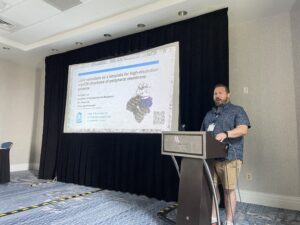Congratulations to the Baker lab on their amazing work using nanodiscs to solve structures of peripheral membrane proteins is now available online in the Journal of Structural Biology. Thank you to Postdocs Kevin Cannon and Reta Sarsam for their hard work! This research will be published in the September issue of JSB.

Lay Summary
There are over one hundred thousand structures deposited into the protein data bank. Despite this, there are only a handful of structures of proteins bound to membranes. In this paper, members of the Baker lab use cryoEM and membrane platforms called nanodiscs as a way to solve high-resolution structures of proteins that transiently engage the membrane.
Abstract
Peripheral membrane proteins are ubiquitous throughout cell biology and are required for a variety of cellular processes such as signal transduction, membrane trafficking, and autophagy. Transient binding to the membrane has a profound impact on protein function, serving to induce conformational changes and alter biochemical and biophysical parameters by increasing the local concentration of factors and restricting diffusion to two dimensions. Despite the centrality of the membrane in serving as a template for cell biology, there are few reported high-resolution structures of peripheral membrane proteins bound to the membrane. We analyzed the utility of lipid nanodiscs to serve as a template for cryo-EM analysis of peripheral membrane proteins. We tested a variety of nanodiscs and we report a 3.3 Å structure of the AP2 clathrin adaptor complex bound to a 17-nm nanodisc, with sufficient resolution to visualize a bound lipid head group. Our data demonstrate that lipid nanodiscs are amenable to high-resolution structure determination of peripheral membrane proteins and provide a framework for extending this analysis to other systems.
Publication link
Kevin S. Cannon, Reta D. Sarsam, Tanita Tedamrongwanish, Kevin Zhang, Richard W. Baker,
Lipid nanodiscs as a template for high-resolution cryo-EM structures of peripheral membrane proteins,
Journal of Structural Biology,
Volume 215, Issue 3, 2023,107989, ISSN 1047-8477.
